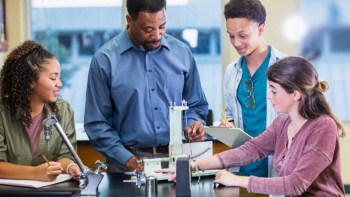Charlie Ironside is an adjunct professor (semi-retired) in the Department of Physics and Astronomy at Curtin University, Western Australia, specializing in semiconductor optoelectronics. He spoke to Tami Freeman about his life and work there.
This post is part of a series on how the COVID-19 pandemic is affecting the personal and professional lives of physicists around the world. If you’d like to share your own perspective, please contact us at pwld@ioppublishing.org.

On a normal workday, I would usually write either papers or grant proposals – so in the mornings from around 8 am to 12 pm, I write. I now only have one part-time PhD student who I supervise and meet every week. Some days I’m in the lab working with a focussed ion beam (FIB) instrument on various types of nanoanalysis of materials. Because I’m semi-retired, in the late afternoons, I either go to the gym or play tennis with mates.
When I started to write this at the weekend, we were not yet in full lock-down in Western Australia and it seemed likely we would lock down sometime in the following few weeks. At my university, there was some preparatory work for the anticipated lock-down with courses going online and lectures cancelled.
Events moved quicker than I had anticipated – Western Australia is now in lock-down and the lab is effectively closed. But we are able to operate the Focussed Ion Beam system remotely – my colleague at work loads the samples into the machine and then we’re good to go.
In the next few weeks, I plan to write papers and proposals – so that’s pretty much business as usual. Also I will keep in touch with colleagues via conference calls. I’ve cancelled all travel.
My biggest concerns are around getting the right balance between over- and underreacting – the key to getting the right balance is reliable information. But still I do fear that many people will overreact and that will cause as much harm as the actual virus.

Physics in the pandemic: ‘Experiments might have stopped, but thinking won’t’
One silver lining is that, from now on, the reaction to this sort of outbreak will be much more finely tuned and we will now urgently invest in technologies that provide protection from contagion. This includes much better infection control technologies, pathogen identification technologies, and more rapid development of vaccines and mono-clonal antibodies.
We need to learn from this outbreak and be thankful that we’ve had an early warning (yet another!) that will hopefully turn out to be not as deadly as it could have been.



